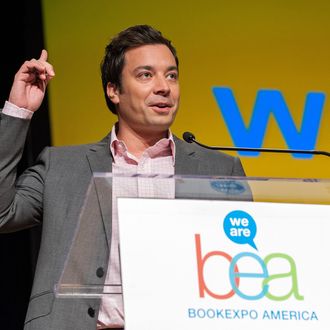
On the closing morning of the publishing industry’s annual BookExpo America, the breakfast panel was, like Tuesday’s, a grab bag of giants and lesser-knowns, authors and “authors.” Jimmy Fallon read a couple of “thank-you notes” from his second collection of the signature gags, before concluding with a can’t-miss crowd-pleaser (“Thank you, Kindle, for being able to hold over 1,400 books, and never being as good as holding the real fucking thing in my hands”) and then promptly vanishing offstage. Yet wherever he escaped to was almost certainly less entertaining than watching Kirstie Alley anchor talks by Michael Chabon, Zadie Smith, and The Tender Bar author J.R. Moehringer.
A theme of sorts did emerge from the chaos. Every author sold his or her book to the assembled crowd of booksellers not so much by explaining it as by displaying a natural gift for the art of storytelling.
That would include Alley, who is either a comic genius or the queen of unintentional humor — going back to a short story she wrote in college that was meant to bleak, only to be praised by her professor as a masterful spoof. Alley led us way back through her unsentimental education, which involved reading 50 books in high school by “Mr. Cliff” and only one real one, A Separate Peace. This, she’d felt, qualified her to major in English literature. It didn’t; she flunked Chaucer and found a new obsession: men.
Which brings us to her memoir, The Art of Men. The book actually plays, like much of her post-Cheers career in general, on the art of self-sabotage. This is the woman, after all, who cried on Courtney Love’s shoulder over a man, only to be told, “I’ve been with every freak in Hollywood; this dude is fucked up. And you know what? You’re fucked up for being with the motherfucker.”
Alley then compared her book favorably to the publishing punch line du jour, Fifty Shades of Grey: “I’m not here to one-up another author but you know, I didn’t find it very factual. I lived with a guy for three years who made Christian Grey look like Justin Bieber. [Christian] didn’t even pee on her. He didn’t choke her or try to suffocate her … If it’s S&M you’re looking for, then you will like my book.”
Urination and domestic violence — a tough act to follow, but Michael Chabon did so gracefully. Unsurprisingly, the story he told was considerably more polished and broader in scope. Telegraph Avenue, his forthcoming novel, is partly a send-up of Berkeley, where he lives, but it’s also a sweeping and colorful story about the recent history of race in America. It also documents Chabon’s own realization that he had transformed from an idealistic kid in integrated Columbia, Maryland, into a yuppie post-boomer who had absorbed the liberal world’s subtle hypocrisy.
Zadie Smith’s new novel, NW, will also home in on a well-drawn place (in her case Northwest London), but the story she told wasn’t really about that. It was, instead, a narrative of sin and redemption. As a young literary wunderkind, she conceded, she’d behaved appallingly to the industry before which she stood. After she’d made the rounds with booksellers, feedback to her publisher included, “What an incredibly rude girl”; “unsmiling”; “disgusting attitude,” and so on. But she’s older now! “I hope for your sakes that I’m a bit better at this sort of thing than I was back then.” If she isn’t, it’s because “trying to promote your own novel is like falling in love with your own reflection.”
If her last novel, On Beauty, was an homage to EM Forster, this one owes a debt to Virginia Woolf. And it redeems a history of writing books that she feels didn’t turn out quite right. “I’ve never really been able to get the book on the page that I had in my mind,” she said, “and this time, for better or for worse, I’ve basically managed to do that.” Still, it took eight years: “I really don’t know what the fuck I’ve been doing with my time.” Maybe she hasn’t quite mastered the art of self-promotion just yet.
The most riveting story was told by the least well-known author, J.R. Moehringer. He spun a great one about the crook Willie Sutton — the one who supposedly said he robbed banks because “it’s where the money is.” Moehringer’s new novel, Sutton, fictionalizes that robber’s complicated life.
Moehringer closed with a neat metaphor not for storytelling but for the arduous process of writing a book — a process that begins in excitement, rambles through agonizing self-doubt, and ends in barely averted disaster. He noted a YouTube video currently making the rounds, about an 80-year-old woman who skydives for the first time and goes through much the same process, only with considerably higher stakes. “I don’t have Zadie’s powers of description,” he said, “so just Google it.” (Some in the audience set immediately upon their Google machines.)
The lesson Moehringer drew from the video: “Sometimes the best thing you can do is not fight it. Don’t overthink it. Just enjoy the ride.” Good advice for skydivers, writers, Kirstie Alley, and anyone attending a grab-bag breakfast panel on very little sleep.

